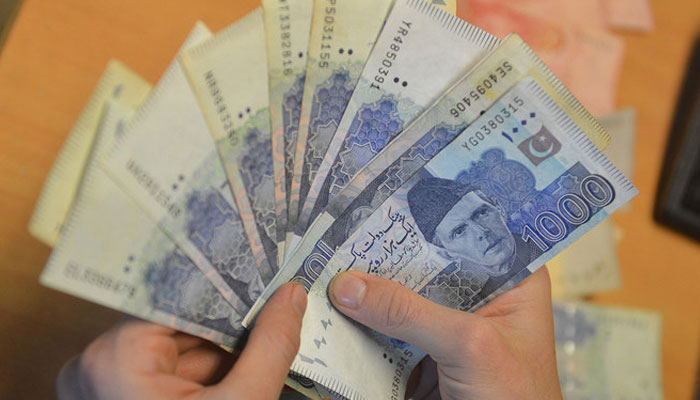In a first, govt buys back Rs351bn treasury bills
The yield on a six-month T-bill due on December 12 was 16.01 percent
KARACHI: The government bought back Rs351 billion worth of market treasury bills for the first time at an auction on Monday, aimed at reprofiling large maturity due in December of this year and reducing the domestic debt servicing costs.
Analysts were keeping an eye on whether market participants would reach the government’s Rs500 billion buyback target in the wake of the cancellation of the last T-bill auction.
“The government of Pakistan has made a significant and historic move by initiating a buyback of short-term T-bills worth Rs351 billion (against the target Rs500 billion) set to mature in December 2024, leveraging liquidity from the recent SBP profit transfer to finance this effort, we view,” Arif Habib Limited said in a note.
“We believe this initiative will play a crucial role in reprofiling the government’s debt, reducing interest costs, and enhancing overall market liquidity. By taking this proactive step, the government aims to strengthen its financial position while fostering a more stable economic environment,” it said.
The yield on a six-month T-bill due on December 12 was 16.01 percent, and the yield on a six-month paper maturing on December 26 was 16 percent, according to the auction results released by the State Bank of Pakistan. The yield on a 12-month note maturing on December 12 was 16.01 percent, while the yield on a 12-month paper maturing on December 26 was 16 percent.
“Buyback of treasury bills would allow the government to save Rs11.66 billion in debt servicing. However, the buyback amount is lower than the target but same would allow the government to raise fresh money at cheaper rates,” said Awais Ashraf, the director research at AKD Securities Limited.
A faster-than-expected reduction of interest rates is indicated by the steep decline in yields, with one-year T-bills falling from 23 percent to about 14 percent and the 10-year bond from 17 percent to 12.7 percent. This strategic repurchase will probably improve money market liquidity, further lowering rates and strengthening the government’s debt metrics.
The SBP has cut its benchmark interest rate by 450 basis points to 17.5 percent since June. Saad Hanif, the head of research at Ismail Iqbal Securities, said leveraging liquidity from the recent SBP profit transfer, this buyback is a clear signal of the government’s intention to reduce its debt burden proactively.
“By repurchasing these T-bills, the government aims to lower its overall interest expenses, particularly in a high-rate environment. This action helps to reprofile its short-term debt, ensuring a more manageable repayment schedule,” Hanif said.
This buyback will also positively impact market liquidity, injecting capital back into the financial system, which could encourage lending and investment in the broader economy,” he added.
Additionally, by reducing the outstanding short-term debt, the government is likely to ease some of the pressure on interest rates, potentially stabilizing borrowing costs for the private sector, he noted. “Coupled with the improving macroeconomic situation such as the recent IMF programme resumption and fiscal reforms this move reflects the government’s effort to maintain fiscal discipline and create a conducive environment for sustainable economic growth.”
-
 ‘Disgraced’ Andrew Still Has Power To Shake King Charles’ Reign: Expert
‘Disgraced’ Andrew Still Has Power To Shake King Charles’ Reign: Expert -
 Why Prince William Ground Breaking Saudi Tour Is Important
Why Prince William Ground Breaking Saudi Tour Is Important -
 AOC Blasts Jake Paul Over Bad Bunny Slight: 'He Makes You Look Small'
AOC Blasts Jake Paul Over Bad Bunny Slight: 'He Makes You Look Small' -
 At Least 53 Dead After Migrant Boat Capsizes Off Libya
At Least 53 Dead After Migrant Boat Capsizes Off Libya -
 'God Of War' Announces Casting Major Key Role In Prime Video Show
'God Of War' Announces Casting Major Key Role In Prime Video Show -
 Real Reason Prince William, Kate Broke Silence On Andrew Scandal Revealed
Real Reason Prince William, Kate Broke Silence On Andrew Scandal Revealed -
 Drew Barrymore Responds To 'Charlie's Angels' Costar's Comments About Her
Drew Barrymore Responds To 'Charlie's Angels' Costar's Comments About Her -
 Shakira Slips Hard On Stage During Life Show
Shakira Slips Hard On Stage During Life Show -
 King Charles Speaks Out Over Andrew's Scandal: 'Stand Ready To Help Police'
King Charles Speaks Out Over Andrew's Scandal: 'Stand Ready To Help Police' -
 Dax Shepard Recalls Horrifying Accident That Almost Killed Him
Dax Shepard Recalls Horrifying Accident That Almost Killed Him -
 Logan Paul's Bodyguard Hits Fan On Super Bowl Day
Logan Paul's Bodyguard Hits Fan On Super Bowl Day -
 Epstein Files: Anne Hathaway Mentioned As Highly Desired Guest For Bill Gates?
Epstein Files: Anne Hathaway Mentioned As Highly Desired Guest For Bill Gates? -
 Prince Harry Under A Lot Of Stress As Meghan Markle Makes Bizarre Demands
Prince Harry Under A Lot Of Stress As Meghan Markle Makes Bizarre Demands -
 Princess Beatrice, Eugenie's Subtle Break From Disgraced Parents Exposed
Princess Beatrice, Eugenie's Subtle Break From Disgraced Parents Exposed -
 Baby Left In Running Bathtub Dies After Father ‘forgets’ Him
Baby Left In Running Bathtub Dies After Father ‘forgets’ Him -
 King Charles Takes A Major Step To Keep Horrified Prince William Out Of The Loop On Andrew: Insider
King Charles Takes A Major Step To Keep Horrified Prince William Out Of The Loop On Andrew: Insider




